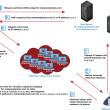Companies are increasingly migrating to cloud-based servers to store their data. More than half of all businesses report that their data is stored in the cloud, and it’s easy to see why.
Moving to the cloud enables your company to scale efficiently, storing more data as you need it. There is no need to worry about updating software, which is so important when storing data on hardware. Employees and clients can easily collaborate, no matter where they are working, which has proved to be essential during the coronavirus lockdowns.

Companies can have full control over all their documents and information, granting or revoking access to a centrally stored document as needed. Backing up data is simpler than ever. Small companies have no need to invest in special equipment for their employees, as the cloud is accessible from any device from users who have permission.
It is perhaps this ease of accessibility that has 90% of companies worried about the security of their data in the cloud. In this article, we will discuss how that concern is a misconception, and why the cloud is actually a very secure way to store data. This does not exempt companies from focusing on cybersecurity in the areas in which they have the most control: implementing the correct procedures and investing in the right technologies.
Misconceptions about cybersecurity with the cloud
When people feel like they are giving up control of something, they feel more vulnerable. Migrating to the cloud allows companies to relinquish a lot of responsibilities, such as providing their employers with company-approved PCs. Employees can work remotely with more ease, and there is less of a focus on making sure antivirus software stays updated on hardware since data is well-protected on the cloud.
Cloud servers enable employees to access their work nearly everywhere with a WiFi connection. From scanning invoices for expense reports effortlessly to collaborating on a project with team members on a different continent, cloud-based workplaces make work possible outside the office. With the available technologies of today, invoices sync seamlessly with your accounts via the cloud, so you’ll always have an accurate picture of your business’s financial state.
There is a feeling of broader reach and accessibility that accompanies migrating to the cloud. This may contribute to the negative perceptions people have that their data might not be so secure. They view every data related issue as being real-world data problems in their nebulous concept of what “the cloud” means. But in reality, that’s not the issue.

The truth is that the cloud is a secure place to store data. Popular business publication Gartner recently updated their report on the status of cloud security and concluded, “Through 2025, 99% of cloud security failures will be the customer’s fault.” In an effort to bring this number even closer to 100%, tech companies are making huge investments in hiring and training data scientists but should be done to educate customers, too.
It’s easy to leave cybersecurity “to the experts” by investing a lot of money in different programs, but the real key to cybersecurity is more basic than you would think. For every credible business that operates on a cloud-based server, cyber-literate employees with good digital hygiene are the most valuable tools in keeping your company safe. In this article, we will give you some of the best ways you can teach your employees to stay safe online and protect your company’s image.
How to make your cloud-based workplace (cyber)secure
Here are the six most critical steps for making your cloud-based workplace more secure:
1 – Make it company policy for all employees to use a password manager
A good password manager is essential to cybersecurity, so it’s a wonder why so few companies mandate their use. It is very common for users to have the same password for a variety of different websites and applications – it’s easy to remember.
However, keep in mind that the game your employee plays on his or her smartphone might have lackluster cybersecurity measures or might be harboring spyware. If your employee uses the same password for, say, Fruit Ninja as s/he does for your company’s database, you are in trouble. Make it a company policy to use a password manager, because this ensures that every employee has a complex and unique password.
The password manager stores all the information for the employee so there is no fear of the dreaded “Monday brain” causing him or her to forget. This is number one on our list because, of course, your cloud server can be accessed by anyone with the right credentials and password. This is the single most important step for those who are concerned about security on the cloud.
2 – Teach your employees internet hygiene
This one might seem obvious, but it’s important to understand that all your employees need to have basic cybersecurity training – from those at the very top to those at the bottom. One of the most common ways companies get hacked is through phishing emails.
Have you trained all your employees to refrain from clicking on links from suspicious email addresses? Are they familiar with the concept of social engineering and how many cybercriminals use this to hack into devices? Do they understand why they should never share their passwords or company-issued devices, even with people who are friends and family?
3 – Make it a company policy to use a Virtual Private Network (VPN)
If you are serious about cybersecurity, you probably already have a VPN in your office. But do you have a VPN policy for your remote workers, whose legions have grown since the coronavirus pandemic?
Do you have VPNs set up for your employee’s smartphones, for when they are standing in line at Starbucks on public WiFi scrolling through their emails? VPNs today have left the enterprise, being user-friendly and affordable for the average consumer, so there is no reason not to make their use of company policy for all devices.
4 – Invest in a high-quality antivirus program with a focus on malware
Remember how we said that companies with cloud-based operations have to worry less about antivirus software because this is taken care of by your provider? That still doesn’t exempt a company from installing anti-malware programs on office PCs and business phones. Although hacking into the cloud is more difficult than hacking into someone’s computer, we can expect that your employees may have to save files to their laptops or PCs occasionally.

Make sure their devices are protected should an unwanted visitor gain access. There’s a variety of great options for anti-malware software to ensure that adware or a virus doesn’t infect your system. It’s important to commit to one and make it a company policy to enable it and update this on a consistent basis.
5 – Consider a Cybersecurity Incident Response Plan (CIRP)
Does your company have a plan for how to react in the event of a cybersecurity incident? Is everyone aware of it? Take the time to pinpoint which areas are most vulnerable to your company or your industry. Work with your IT department to come up with a detailed response plan which will provide all departments with directions on how to proceed in the event of a cyber attack.
6 – Choose your cloud provider wisely
There are many excellent cloud-based servers, so be sure to find one that meets your needs. Most cloud software encrypts data and allows for user permissions, but other features vary.
A great feature to look for in a cloud-based server is one that enables you to share files via a link but sets an expiry date for the link. Many are HIPAA compliant for those in the US healthcare industry. Quite a few offers automatically deleted file retention, which will prove useful, as well as dedicated customer support.
Conclusion
Whatever industry you are in, it’s obvious that migrating to the cloud is the right choice. The cloud’s ease of use and scalability might make companies feel like they are losing control of their data, but the opposite is actually true. Putting high-level cybersecurity into the hands of the experts – the people designing the cloud software and monitoring the platform for hacking – will enable you to focus on the biggest factors you can control.
The best way to prevent cyber attacks is to train all your employees on basic cybersecurity measures, and ensure that your communication and enforce company policies that facilitate safe online behavior.
Did you enjoy reading this article? Don’t forget to like our page on Facebook and follow us on Twitter!










The information you’ve shared in this blog is very remarkable.